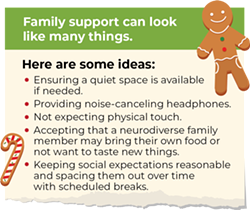By Alli Frazier, CEO of Frazier Behavioral Health and Autism Mom
Happy holidays everyone! If you are like me, regardless of what holidays you celebrate, navigating it with a neurodiverse family member takes extra thought and planning. Stress can come from both internal and external pressures about your child’s behavior. When your child does not navigate the world in a neurotypical way, it can sometimes feel like you and your child are under a microscope at family gatherings.
So in an effort to ensure your holiday season is smooth sleighing, here are some tips I have learned over the years when raising my son with autism to make the holiday as enjoyable as possible for everyone involved.
Educate your family about your child’s preferences
Every child, neurodiverse or otherwise, has preferences, and that applies to physical touch, like handshakes and hugs. Understanding these boundaries is half the battle to making your child more comfortable. The other half is communicating those preferences to relatives and other people, especially when your child with autism may not have the voice or language skills to communicate this themselves.
Educate your extended family members and friends that loud or unexpected noises can be difficult for neurodiverse individuals and request a quiet space where your child can decompress. Discuss any repetitive language, behavior, or interests your neurodiverse family member may engage in, so that extended family is prepared to show acceptance and understanding. Talk about how perspective-taking is a challenge for your neurodiverse child and ask that they not be offended by any blunt verbalizations or lack of excitement about a particular gift or activity.
Make opening presents fun
Some kids love opening presents, and you need to do everything you can to ensure they don’t open them as soon as they see them. However, that is not always the case. Gift receiving can be emotionally overwhelming to neurodiverse individuals, especially if they feel the pressure of the social exchange. Neurotypical people learn at an early age to engage in a social fake even when we do not like a gift. Neurodiverse individuals often find this kind of social interaction uncomfortable, emotionally draining, or overwhelming. If people do not understand this, they might get their feelings hurt.
Here are some steps to help everyone have a more enjoyable experience with gift-giving. If your child does not like opening gifts, consider giving small gifts each day leading up to the holiday celebrations with something inside that you know your child would like, this can be something small like a piece of candy. This daily ritual can start to build excitement. If your child does not enjoy opening gifts on the day of the celebration because they find the content boring, try mixing in several small appealing gifts, even if it is just a small snack or piece of candy. This intermittent reinforcement can be a powerful motivator to keep opening. If your child seems overwhelmed by the quantity of gifts, remember there is no rule that they all must be opened at once. In our house, my son opens gifts throughout the day and sometimes throughout the whole week.
Create realistic expectations and communicate needs
Set yourself and your child up for success by setting attainable goals. An example of an attainable goal might be socializing with family for 30 minutes during a three-hour get-together. Each child is different, so develop your expectations with their tolerance or abilities in mind. The next important part is communicating with your child about what to expect. The child may benefit from a schedule or social story that outlines how long the festivities will last, who will be there, the order of activities, and how people might behave (hugging, loud excited voices, laughing, sitting together, etc.). These schedules or stories can be pictorial for non-readers. Next, it is important to communicate with the host or other family members about your child’s social or sensory challenges and how they can show support. Extended family members want everyone to feel comfortable and successful, but without education and support options they are often at a loss.
Praise the small successes and have fun
Whenever your child completes a goal, they should be praised accordingly. Not every goal needs to be a monumental achievement. Success can be saying “Thank you” and “You’re welcome” at dinner. Each goal will vary a little depending on the child, but each one should be celebrated. The most important thing is that the holidays should be fun. So if your child is struggling with reaching a specific milestone, don’t be afraid to switch up the plan to make the occasion, outing or get-together more fun and less stressful for everyone.
Don’t feel like you have to celebrate the same way as everyone else
When some people picture the holidays in winter, they sometimes have this picturesque Hallmark-like idea of what they should be. Families of a child with autism often do not fit into that mold. Your child is unique and one of a kind, so you can make your plans the same way. There are many fun activities that do not require intense social interactions like sledding, snowshoeing, drinking hot chocolate with a movie, playing video games, etc. Pick activities that are fun and manageable for the whole family. My family appreciates the many Cleveland sensory-friendly activities, and my son’s favorite is The Wild Winter Light walkthrough at the Cleveland Metroparks Zoo. Check out online lists of attractions and activities, planning to try out those that fit your child’s interests, are sensory-friendly, and are a good fit for your child and family.
If you are interested in you, your family, your child or someone you know receiving evidenced-based individualized therapy? Contact Alli Frazier’s company Frazier Behavioral Health, a behavioral health clinic that focuses on the person and helps children and adults with behavioral, social, communication and sensory issues at FrazierBH.com/Scene.
Can’t get enough of Ask Alli? Check out previous Ask Alli segments on the Cleveland Scene website by clicking here and for the upcoming Ask Alli TV segment on December 12 at Facebook.com/FrazierBehavioralHealth.






